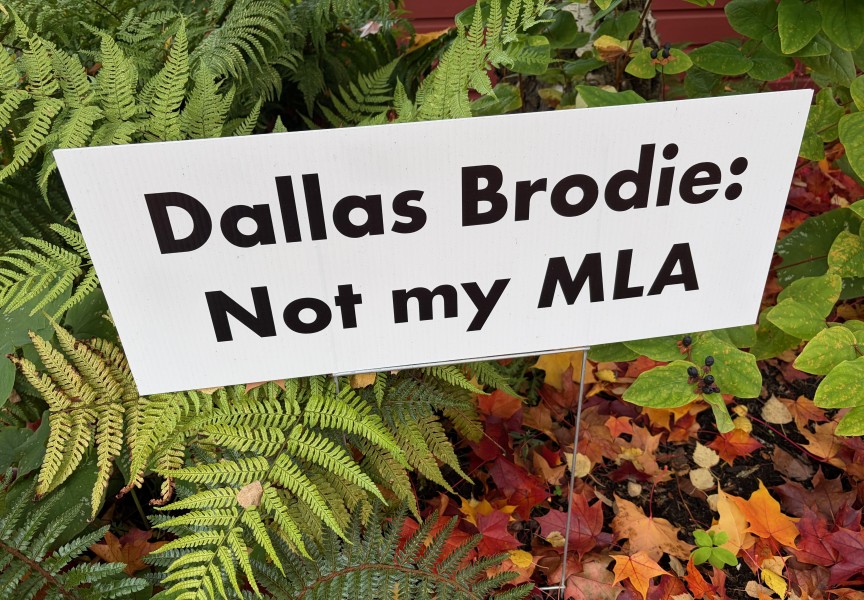Huu-ay-aht First Nations has been awarded a $1 million Weaving Justice Grant that they plan to use to improve its tribunal process. The announcement was made February 10, 2025.
John Jack, Huu-ay-aht’s elected chief, said that, as a treaty nation, they have self government through the Maa-nulth agreement.
“And while that gives us the ability to make our own laws and policies, we still have to make them,” he stated.
In preparation for self-government, the Huu-ay-aht had to create its own constitution, which forms the basis for all laws the nation follows within the Huu-ay-aht system.
“And then we have a bunch of other laws…so these are like the Elections Act, the Government Act, the Financial Administration Act, the Code of Conduct…and that sort of thing,” said Jack.
He went on to say that the creation of laws is done within Huu-ay-aht Legislature, which is an elected body. Implementation of those laws is overseen by Huu-ay-aht’s Executive Council.
“And when we make decisions as a council, we have to make sure we make decisions within the scope of our constitution and within the scope of our laws,” said Jack.
The scope includes several acts, but also, very importantly, their Code of Conduct and Conflict of Interest Acts. The work of HFN administration staff is guided by these laws and so is that of executives and council.
But in the event of a failure in the system, there’s a third body in place that can provide correction, if need be. For Huu-ay-aht, that body is their tribunal.
According to Huu-ay-aht’s website, the Tribunal Act intends to break the colonial legal traditions and embed Huu-ay-aht values and principals. The tribunal, according Jack, serves to ensure that the laws are being interpreted and carried out correctly. But it also serves to ensure that elected leaders, and leaders in general, are held accountable to the law.
Huu-ay-aht’s tribunal has a chair and vice-chair who are lawyers with at least 10 years work experience in the justice system. They are joined by three HFN citizens.
“We need someone that can interpret laws correctly,” said Jack.
This mechanism also helps to ensure decisions made at the tribunal level are impartial.
Chief Jack shared that their tribunal process has been used a couple of times – and once resulted in the disqualification of a council member as a consequence of breaches in the Code of Conduct.
“In going through this and another similar process, we’ve learned that there are limitations in its effectiveness in keeping members of our government accountable to our laws because it assumes that people will automatically stand up and call out bad actions, and that’s not how power works all the time,” Jack shared.
“When [there’s] bad behaviour that breeches our laws or policies, it’s usually not in light of day unless someone makes a complaint,” he continued. “I think due to some of the consequences of colonization and intergenerational trauma, people are preconditioned to stay silent.”
He went on to describe conditions in which it can be difficult for citizens to file complaints against people in authority, particularly in smaller communities where everybody knows each other and families come together to protect one another and tell victims to be quiet.
Jack spoke of the typical backlash people have received for filing complaints, which goes beyond “not just being mean in the grocery store”. A portion of the grant will go towards examining this issue. Jack says the nation will seek feedback from its citizens on how the tribunal process can be improved in a way that holds leadership accountable to Huu-ay-aht’s laws and seeks ways to make it less traumatizing for citizens to file legitimate complaints.
The review of the HFN tribunal process looks at ways in which people will be protected harassment after filing a complaint. Jack says he doesn’t know how it will be done, but there’s always room for improvement.
“We can always do better as a nation and we can always protect those who are vulnerable,” he said. “We want to go through a process that can help all our people have trust in all our institutions. That if somebody does wrong, and they’re powerful, they can still be held accountable because no-one is above the law.”
The Weaving Justices Grant comes from the Law Foundation of British Columbia.
The Huu-ay-aht Tribunal Act has been in operation since the 2011 treaty signing and has been amended at least twice since its inception.
The Weaving Justice Grants are created to uplift and support the work of Indigenous people, organizations and communities working to overcome the impact of external laws and institutions, while restoring power to their communities.
According to the Law Foundation of British Columbia, the Weaving Justice Grants are focused on supporting work to heal Indigenous families and communities through legal education, research, services and law reform.
Eligible applications may include a range of activities connected with the development and application of law and legal education. Applicants may be those focused on drafting Indigenous laws for communities.
There are three types of Weaving Justice Grants available. Huu-ay-aht secured the largest one, called the Cedar Grant which provides $250,000 per year, over four years. They will use the grant to review and improve their tribunal process over the next four years.
Huu-ay-aht First Nations has hired a project lead, Dr. Heather Castleden, who will carry out the work in four phases, beginning with researching Huu-ay-aht’s tribunal process. Over time, recommendations will be made to improve the process.
Huu-ay-aht citizens will be invited to participate in the project through interviews and community engagement events.








